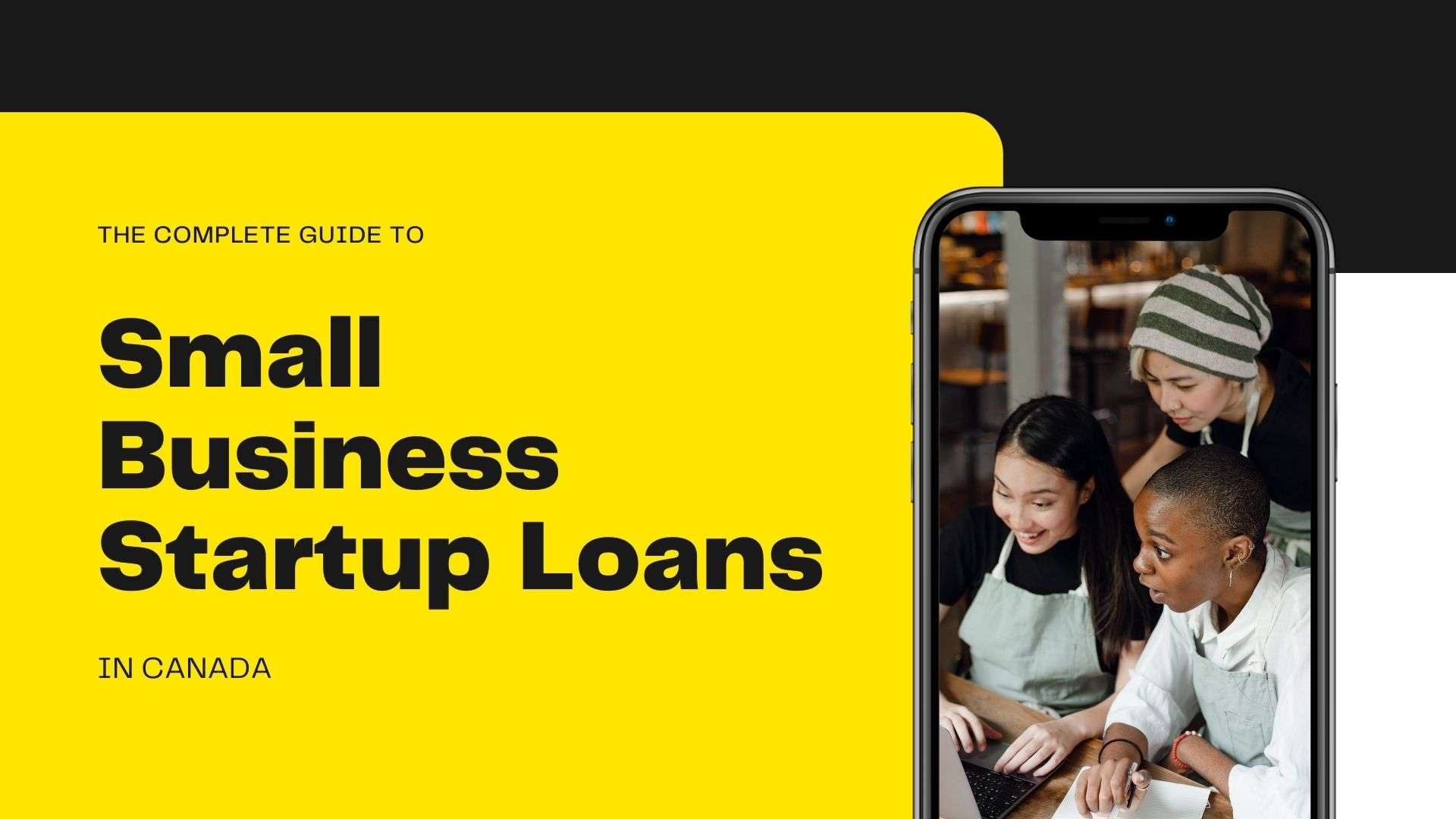The Complete Guide To Small Business Startup Loans in Canada
Category: Funding & Financing
As a small business starting up in Canada, it is extremely difficult to start a proper business without having the capital to back you up. Most business owners will take advantage of a small business startup loan in some way.
The added capital can give you the boost your small business needs to succeed. So, if you need a startup loan for your small business, there are a few key loan options to consider.
- Using your personal loans, lines of credit, credit cards, or even a mortgage
- Taking out a business loan (not personal)
- Working with an investor or business partner (with the needed startup capital)
- Using small business loan options provided by the Canadian government
Most business owners start with a small business loan as it helps with the initial expenses that your business has. As the costs of starting a small business are slowly going up, the more capital you have available, the easier it will be to control your business.
What is a Small Business Startup Loan?
A small business startup loan is simply put, the capital provided to a business owner in order to start their small business and to cover the various costs they may have during the process.
Generally, business loans are provided by bank organizations or the various levels of the Canadian government in the form of government loans.
Traditionally startups try to gravitate more towards the bank loan options as they are most familiar and often do personal banking with them. While it is easier, it can often hurt your business to not shop around for a startup loan.
Banks often have strict terms with their business loans and the interest rates are not very flexible, and often are high for a startup to benefit much.
Government loans on the other hand, if you can find the right small business startup loan option for your needs can come in the form of a no-interest loan, a low-interest loan, or perhaps be a guaranteed government loan that protects your business in case things go south.
How do Small Business Startup Loans Work?
Small business startup loans are no different than borrowing money from any lender.
As you take out an amount to use towards your small business, to cover the various startup costs and operating expenses, it is borrowed with interest applied. This interest, plus the original balance is tied to a repayment plan.
A lender, be it a bank, private loan company, or a government agency providing a government loan will review a number of key factors that help them determine your business potential.
These factors can include:
- Your credit score (while it can be a factor it is not always a determining factor)
- The amount of money that you are looking to borrow
- The purpose of the funds you want to borrow the money for
- Your business plan and potential that the business has
With these few, as well as an umber of other factors, the lender of the small business loan may use the information provided to available your options and see if you are fit to take on the loan, the percentage of interest, the repayment terms, and the loan specifics.
When it comes to startups, however, if you have just started your small business or are in the works to launch, getting a business loan without any trading history may be a bit difficult. Simply as there is no significant history to back your loan off of.
In this case, the potential lenders may also consider alternative factors in determining your likeliness to succeed and pay off the debt.
These factors may put a larger emphasis on
1) your business plan,
2) collateral,
3) personal guarantees
Your Business Plan
The business plan is always the first step you should focus on as a small business startup. A properly developed business plan will ensure that your business idea is thought through and that you consider the entire model in fine detail.
By having a detailed business plan, you can use it with a bank or with a government loan provided to help secure the needed loan for your small business.
Banks, govenrment agencies, and private lenders may give your business more value than your credit score if you have a solid business plan to apply with – one that shows potential.
To ensure you have a solid business plan, the Business Plan Tool is a great way to get started, with expert guidance.
Small Business Collateral
Collateral is money.
If you have collateral to put towards your small business loan, it is creating a guarantee that you have something to give back, if things don’t go as planned.
Collateral can often be anything of value; a vehicle, equipment, machinery, a house..etc; as long as it can be sold off, or liquidated to help pay off any outstanding small business loan debt if it comes to it.
Asking for funding with collateral is ensuring that you and the lender share the risk, allowing you a greater chance of securing a small business loan with better interest.
Personal Guarantees
Being a brand new business, no matter if you have started or are thinking of starting, your trading history (the amount of time in business collecting money), is very limited. So, this is not much to go off of when trying to secure a business loan.
Having a personal guarantee will often help as it can give the lender a level of security that if things don’t work out with the business and you default on the loan, there is still a chance for them to recoup some of the money.
Personal guarantees can impact your personal situation; so before you borrow any funding on a personal guarantee, be sure to understand it in full and know what it can mean for you personally.
Types of Small Business Loans Available in Canada
- Bank loans
- Private business loans
- Government loans
Bank Business Loans
As mentioned above, most people gravitate towards their bank when starting a small business and are in need of a small business startup loan.
It feels like the safe option, however, in most cases the bank loans that are made available are not very friendly towards startups or new business owners looking to make a move.
Most banks provide these loans as a revenue method – meaning, they provide the funds to you in hopes to profit from your interest. This leaves very little room for you as a small business owner to negotiate the interest rates, terms, and repayment options.
This puts you at a disadvantage as your bank loan payments are high and in many cases hurting your cash flow which is so crucial early on in your startup phase.
Considering all small business loan options is always recommended before signing any papers to get the needed funds.
Private Business Loans
Unlike banks, private business loans are much more flexible.
Depending on the option, or the lender you approach, your small business may be able to benefit from a number of differently set up loan repayment options.
From a traditional loan to fractional loans (loans that are repaid based on your revenue, over a period of time); loans that are conditionally repayable, or even loans that are based on your purchase orders.
While they are more flexible, the interest rates can also vary depending on your business goals and needs.
Government Loans
In addition to the traditional bank loans, private lenders, another option to consider when starting up and in need of a small business startup loan would be the government loan options.
The Canadian government has a number of different government loan options that small business owners can take advantage of. These loan programs include no-interest loans, low-interest loans, guaranteed government loans, and loans that are conditionally repayable, often with great terms to help small business owners.
Each government loan program has different terms and requirements but is extremely worth the work in comparison to a bank loan. To see available government loans, access the Funding Database.
Who generally gets approved for a small business bank loan?
To borrow any money from the bank, there are certain factors that you have to meet to qualify.
Traditional banks typically lend money to small business owners that are legally registered and can show on paper the potential to repay the borrowed money.
To ensure that the bank sees your business as favorable, they will often look at your personal credit score, ensure you have a reliable income personal or business and have assets or some sort of collateral to put down.
These factors will help the bank share the risk with you.
Banks are 100% aware that credit ratings take time to build, especially for a new business. With that being said, they may willing be able to accommodate with a lower interest rate with collateral put up or a personal guarantee.
Banks are not always the best for startups due to their trading history. Consider applying to a government loan program instead to benefit from more of an emphasis on your business plan as you apply.
How much can my small business borrow in a loan?
When borrowing money, especially in the form of a small business startup loan, it is best to take the guesswork out of it and focus your efforts on building a solid business plan that will provide you with a more specific understanding of how much you really need.
Knowing how much you need in terms of funding will help you when you are looking to borrow the needed funds.
While loans for a small business can be made available as little as a few hundred dollars, they can go upwards of a million as well.
The real question is, how much are you eligible for as a small business startup?
As not all lenders will provide you what you ask, since funding depends on many factors, it is a good idea to determine what you really need before making any move.
Your business plan will help you determine your startup costs, operating costs and will ensure you have a clear idea of how much money you need to borrow to make it work.
What is the Average Interest Rate on a Small Business Startup Loan?
Since each lender is different and each business loan applicant is looked at differently, there is no standard interest rate. However, small business loan interest rates depend on the current market rate; that can give you an idea as to what to look for.
Generally speaking, depending on your credit rating, interest rates can go from as low as 2% to as high as 20% or more via private lenders.
If you are seeking lesser interest rates, consider govenrment loans as they have options that may be guaranteed loans, or even come with little to no interest.
Most lenders will however provide you with an interest rate that is based on the perceived level of risk and this will depend not only on the borrower and the amount requested but also on the length of the loan term and the purpose of the loan that your small business may have.
What are the average loan periods for a Small Business Startup Loan?
Typical loan periods for a small business startup loan vary from business to business, but also the lender providing the funds.
Since many startup loans can be open-ended, the business owner has the ability to pay off the loan at any time – leaving the window entirely up to you as the business owner.
That being said, some term business loans can be as little as 90 days to 10+ years.
The terms really depend on your needs and what the lender and you negotiate.
Do keep in mind that the longer the term, the more difficult it is to obtain the needed loan – shorter terms are a safer bet for the banks and less risk is being taken on.
How To Apply for a Small Business Startup Loan
Before you consider applying for any small business startup loan, it is a good idea to completely understand your business model as well as your funding needs.
Take the needed time to think and properly plan an effective business plan that will outline the costs you need to have covered. This will give you a leg up in your search for small business loans as it can cut down on unnecessary spending, or borrowing.
- What do you need the money for / How will the loan money be used?
- How much do you really need vs How much would be nice to have?
- If you obtain the funds needed, how much can you really afford to pay monthly?
Once you determine the above, consider all of your options when it comes to small business loans; bank loans, private lenders, govenrment loan agencies..etc
To properly apply for a small business loan, your business plan will be your best friend. With a clear breakdown of how you plan on spending the borrowed money, and as long as other facts match, you should not have a problem securing the needed funds.
Just remember:
When borrowing money, always ensure you do your research. Bank may seem to be the easiest and quickest solution to getting the needed funds – however, they have strict guidelines for acceptance. Private lenders on the other hand can be even faster, often with a 24-hour approval, but be careful of the high-interest rates tied to these. Government loan options, take time and are extremely worth the delay if you can afford to go through the process.
Typical Requirements for a Small Business Startup Loan
Every single lender has a different set of factors and requirements which you as a small business owner must meet before being approved for any business loan.
There are however a few of the similar and key factors that most will review before deciding on your potential with them. These include:
- The status of your business (sole proprietorship, partnership, corp..etc)
- Your business, or personal credit score and rating
- The business model; your business plan, growth plan, and explanation of the funding needs
- The projected financials and potential in the field
Before you consider applying to any small business startup loan program, it is a good idea to ensure you have a solid business plan created.
Once your plan is in place, be sure to collect the documents and have it all ready before you apply – the last thing you want to do is apply without proper documentation and be denied.
Applying for a Small Business Startup Loan for the first time
If this is your first small business and you are looking for a startup loan, do keep in mind that the banks, private lenders, and even govenrment loan agencies will review your work with a fine comb.
They want to find mistakes; things to question; as they are simply protecting themselves from an unsure thing. The unsure thing means giving you the money without a history to back up to ease their concerns.
If you are applying for the first time be sure to go out of your way to provide them with the answers before they ask.
So; get your business plan ready.
Your plan should explain your business model, how you plan on promoting, what you will do to grow the business, a clear breakdown of the money you are trying to borrow, and how you will use it. It is a good idea to create a 3-year financial projection based on what you assume will happen.
You can always get an expert at Canada Startups to help with this process.
If you want to go a step forward, prepare a document that will show the lender that you have calculated your potential revenue, minus expense to determine the bottom line – which will also be the amount you have that you can use towards repayment.
Alternatively, a risk assessment document can help you by explaining to the leader that you are thinking of all of the potential risks.
Bonus Tip: How to Apply for a Small Business Loan from the Government
The Canadian government has nearly 1,500 different funding programs. These options can be found in the Funding Database.
The available government funding options come in the form of government grants, govenrment loans, tax breaks, and credits.
As each government funding program has different criteria, it is a good idea to review each option in the Funding Database to determine the best option for your small business.
In terms of government loans, there are various options that your small business may be eligible for. These include the standard government loans, government-guaranteed loans, low interest, and no interest loans, and conditionally repayable options.
Contact a Canada Startups Expert now to get started with your government funding loan search.
SEARCHES RELATED TO BUSINESS LOANS
I WANT START A BUSINESS IN...
IS THERE HELP IN MY INDUSTRY?
- Expansion Capital
- Funding For Equipment
- Business Acquisition Funding
- Consulting Services
- Hiring & Training Staff
- Management Support Services
- Manufacturing
- Mining
- Professional and IT Services
- Transportation and Warehousing
- Accommodation and Food Services
- Agriculture
- Construction
- Culture and Recreation
- Finance and Real Estate
- Forestry, Hunting and Fishing
- Health and Social Assistance





